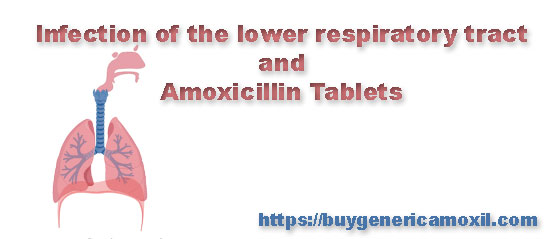Infection of the lower respiratory tract (INDP) is one of the most common diseases in outpatient practice. Amoxicillin tablets have demonstrated high clinical efficacy in starting antibacterial therapy.
ARDS are one of the most common human diseases and still occupy a leading place in the structure of morbidity and mortality from infectious diseases. The incidence of chronic bronchitis in America, calculated on the treatment of patients for medical care, is about 10-15%. With regard to chronic obstructive pulmonary disease, it is known that it is currently a global problem, since the number of patients reaches 15% of the adult population of all developed countries, and the annual number of deaths is more than 3 million people.
In the vast majority of cases (75-80%), the exacerbation of COPD is caused by infectious agents. Among them, bacterial pathogens — Haemophilus influenzae, Streptococcus pneumoniae, Moraxella catarrhalis – are of dominant importance. Less often, Haemophilus parainfluenzae, Staphylococcus aureus, Pseudomonas aeruginosa and representatives of the Enterobacteriaceae family are isolated in sputum samples of patients with acute COPD.
An exacerbation of COPD is understood as a deterioration in the patient’s condition that has arisen acutely and is accompanied by an increase in cough, an increase in the volume of sputum and / or a change in its color, the appearance / increase of shortness of breath, which goes beyond daily fluctuations and is the basis for modifying therapy. In case of exacerbation of COPD, the decision to prescribe antibacterial therapy (taking amoxicillin tablets) in routine outpatient clinical practice is recommended to be taken on the basis of clinical signs and biological markers of bacterial etiology of exacerbation: the leading respiratory symptom is an increase in the degree of purulent sputum in combination with one or two other respiratory symptoms: the appearance or intensification of shortness of breath, an increase in the volume of sputum. If it is possible to conduct a test for the level of C-reactive protein (CRP), the appointment of antibacterial therapy for patients with mild or moderate COPD is recommended at a level of CRP ≥ 40 mg / l in combination with an increase in the degree of sputum purulence, which indicates in favor of the bacterial etiology of the exacerbation of the disease.
Acute bronchitis and amoxicillin tablets
Acute bronchitis (OB) is also one of the most frequent reasons for patients seeking medical help in outpatient practice. It is known that in the USA, more than 2.5 million people are diagnosed with OB annually, in the UK, the incidence of OB is about 40% a year, and in Australia, every fifth reason for calling a general practitioner is due to the course of acute bronchitis.
In the overwhelming majority of cases, respiratory viruses are the etiological agents of OB in adults. The spectrum of pathogens is represented by influenza A and B viruses, parainfluenza, as well as respiratory syncytial virus, human metapneumovirus, less often the disease is caused by coronavirus, adenovirus and rhinovirus infection. The cause of OB may also be S. pneumoniae, H. influenzae, M. catarrhalis. Bordetella pertussis, Mycoplasma pneumoniae and Chlamydophila pneumoniae account for no more than 5-7% of all cases of the disease.

The use of antibacterial drugs in OB is still a stumbling block of practical medicine. Thus, in a number of clinical studies, it was concluded that antibiotics have no effect on improving the condition of patients, and their use is accompanied by a number of adverse reactions.
In accordance with national and international clinical guidelines, amoxicillin tablets are the drug of first choice in the treatment of acute acute bacterial aetiology. It is worth noting that in recent years, an urgent problem has been the spread among pneumococci of strains with reduced sensitivity to beta-lactam antibiotics and the growth of resistance to macrolides.
Amoxicillin tablets research
Prospective interventional study of the efficacy and tolerability of amoxicillin dispersible tablets in the initial antibacterial therapy of adult patients with acute bacterial infections of the lower respiratory tract (except for pneumonia) in outpatient practice.
The study included 818 adult patients (321 men and 497 women) with a diagnosis of “acute bacterial INDP” who received antibacterial therapy with amoxicillin in the dosage form of dispersible tablets. The average age of the patients included in the study was 47 years. The group of patients aged 60 years and older was 210/818 (25.7%), non-smokers – 635/818 (77.6%), with bronchial asthma — 28/818 (3.4%), with concomitant gastrointestinal diseases — 151/818 (18.5%) patients. The most common symptoms of acute bacterial INDP during treatment were an intense productive cough with the separation of purulent sputum and fever.
In most cases (76.2%), the duration of amoxicillin administration was 7 days. The most commonly prescribed amoxicillin treatment regimens were 1000 mg 2 times a day (50.1%) and 500 mg 3 times a day (42.7%). The total number of patients receiving concomitant therapy was 622/818 (76.0%).
The rate of clinical recovery or improvement, which did not require continuation or change of antibacterial therapy, at the end of treatment, estimated at the final visit, was 97.8%.
Conclusions
In this study, amoxicillin in the dosage form of dispersible tablets demonstrated high clinical efficacy of the initial antibacterial therapy of acute bacterial ASD (with the exception of pneumonia). The proportion of patients with the absence of new or worsening symptoms of acute bacterial ASD on 7 ± 1 day of treatment was similar between the studied groups of patients and amounted to about 90% without significant differences between the groups in accordance with the 95% confidence interval. Clinical recovery or improvement at the end of antibacterial therapy was observed in 97.8% of patients. Antibacterial therapy with dispersible amoxicillin tablets was well tolerated by patients.